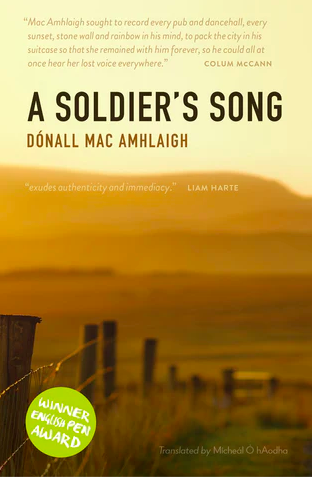A CRITICALLY acclaimed book written by one of the most important Irish language writers of the 20th century has been translated into English for the first time.
Dónall Mac Amhlaigh’s Saol Saighdiúra, which translates to A Soldier’s Song, has been translated by the Irish poet and author Mícheál Ó hAodha.
Mac Amhlaigh may be best known for his books detailing life for members of the Irish diaspora in Britain, but his lesser known A Soldier’s Song is a memoir which reveals the writer’s experiences while serving in the Irish language regiment of the Irish Army.
Born in County Galway, Mac Amhlaigh left school at 15 and found work on farms and in hotels across the west of Ireland.
In 1947, at the age of 21, he joined the Irish Army, where he served within the Irish language regiment until 1951.
After leaving the Army, with unemployment rife across Ireland, he would eventually settle in Britain, where he found work in the construction industry before turning his hand to writing.
His 1964 book Dialann Deoraí, or the Diary of an Exile, which gave an account of his life on building sites across England, became an instant best-seller.
It was published in an English translation by the poet Valentin Iremonger, with the title An Irish Navvy: The Diary of an Exile.
A later book, the novel Deoraithe, published in 1986, covered similar ground, with Mac Amhlaigh’s hero trying to make a living in the Ireland and on the building sites of England in the 1950s.
But prior to writing these hits and many others, Mac Amhlaigh wrote A Soldier’s Song.
Published in Irish in 1962, the memoir documents the intricacies and nuances of his day to day life as a soldier.
 Dónall Mac Amhlaigh’s A Soldier’s Song has been translated into English for the first time
Dónall Mac Amhlaigh’s A Soldier’s Song has been translated into English for the first timeIt has received critical acclaim from across the literary world, with National Book Award-winning author Colum McCann, stating: “Mac Amhlaigh sought to record every pub and dancehall, every sunset, stone wall and rainbow in his mind, to pack the city in his suitcase so that she remained with him forever, so he could all at once hear her lost voice everywhere.”
Now, thanks to the translation by Ó hAodha, the subtle beauty of Mac Amhlaigh’s early work is open to a far wider audience.
This week, as the release date for Ó hAodha’s translation was confirmed, Alan Titley, translator of The Dirty Dust: Cré na Cille, commented on the importance of the collaboration.
“Dónall Mac Amhlaigh’s contribution to Irish literature has been long neglected,” he said.
“Mícheál Ó hAodha’s translation brings us right into his world, giving the original Irish a new life with style and with verve.”
The translated version of Saol Saighdiúra will be released on July 4, publishers Parthian have confirmed.
The Wales-based publisher added that the book has been translated with the support of the global human rights organisation English PEN through their PEN Translates scheme.
“Each year, a dedicated committee of professionals selects books that are translated into English from a wide variety of foreign languages,” the organisation explains.
“Our aim is to celebrate books of outstanding literary quality, which have a clear link to the PEN charter and promote free speech and intercultural understanding.”
Will Forrester, Translation and International Manager at English PEN, added: “English PEN is thrilled to be helping this book reach new readers, in a moment in which exceptional, internationalist and diverse literature is vital.”
Northampton-based Mac Amhlaigh, whose diaries and notebooks are held in the National Library of Ireland, died in 1989 on his way to give a lecture in London.
He is buried at Kingsthorpe Cemetery in Northampton.

